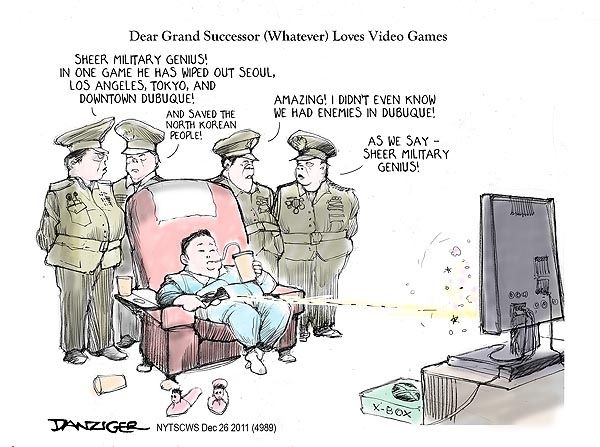North Korea asks embassies to consider moving diplomats out
A North Korean soldier films military vehicles carrying missiles during a parade to commemorate the 65th anniversary of founding of the Workers' Party of Korea in Pyongyang October 10, 2010. REUTERS/Petar Kujundzic
By Guy Faulconbridge and Ronald Popeski
LONDON/SEOUL | Fri Apr 5, 2013 2:31pm EDT
(Reuters) - North Korea has asked embassies to consider moving staff out and warned it cannot guarantee the safety of diplomats after April 10, Britain said, amid high tension and a war of words on the Korean peninsula.
The requests come on the heels of declarations by the government of the secretive communist state that real conflict is inevitable, because of what it terms "hostile" U.S. troop exercises with South Korea and U.N. sanctions imposed over North Korea's nuclear weapons testing.
"The current question was not whether, but when a war would break out on the peninsula," because of the "increasing threat from the United States", China's state news agency Xinhua quoted the North's Foreign Ministry as saying.
It added that diplomatic missions should consider evacuation. North Korea would provide safe locations for diplomats in accordance with international conventions, Xinhua quoted the ministry as saying in a notification to embassies.
Britain said its embassy in Pyongyang had been told by the North Korean government it "would be unable to guarantee the safety of embassies and international organizations in the country in the event of conflict from April 10th".
"We believe they have taken this step as part of their continuing rhetoric that the U.S. poses a threat to them," Britain's Foreign Office said.
It said it had "no immediate plans" to evacuate its embassy and accused the North Korean government of raising tensions "through a series of public statements and other provocations".
A Polish spokesman said Warsaw saw the latest statements by Pyongyang as "an inappropriate element of building up the pressure and we obviously think that there is no risk from outside on North Korea". He added that the Polish embassy saw no need to move staff out.
"This question has been directed to all embassies that are on the ground in Pyongyang," a Swedish Foreign Office official said.
Under the Vienna Convention that governs diplomatic missions, host governments are required to help get embassy staff out of the country in the event of conflict.
Russia's Foreign Ministry said North Korea had "proposed that the Russian side consider the evacuation of employees in the increasingly tense situation", according to a spokesman for its embassy in Pyongyang.
Moscow said it was "seriously studying" the request. A statement from its foreign ministry said Russia hoped all parties would show restraint and considered "whipping up military hysteria to be categorically unacceptable."
ROCKETS
In a fusillade of statements over the past month, North Korea has threatened to stage a nuclear strike on the United States, something it lacks the capacity to do, according to most experts, and has declared war on South Korea.
Military analysts say North Korea might be able to hit some part of the United States, but not the mainland and not with a nuclear weapon.
The threats against the United States by North Korea's young leader Kim Jong-un are "probably all bluster", said Gary Samore, until recently the top nuclear proliferation expert on President Barack Obama's national security staff.
The North Koreans "are not suicidal. They know that any kind of direct attack (on the United States) would be end of their country," he added.
On Friday, South Korean media reported that North Korea had placed two of its intermediate-range missiles on mobile launchers and hidden them on the east coast of the country in a move that could threaten Japan or U.S. Pacific bases.
The report could not be confirmed.
Speculation centered on two kinds of missiles, neither of which is known to have been tested.
One is the so-called Musudan missile which South Korea's Defence Ministry estimates has a range of up to 3,000 km (1,865 miles). The other is the KN-08, believed to be an inter-continental ballistic missile.
The North has always aggressively condemned the regular military exercises held by U.S. forces and their South Korean allies, but its reaction to this year's has reached a blistering new pitch.
"The rhetoric is off the charts," said Victor Cha, former director for Asian affairs at the White House National Security Council.
The verbal assaults from Pyongyang have set financial markets in South Korea, Asia's fourth largest economy, on edge.
South Korean shares slid on Friday, with foreign investors selling their biggest daily volume in nearly 20 months, hurt after aggressive easing from the Bank of Japan sent the yen reeling, as well as by the tension over North Korea.
"In the past, (markets) recovered quickly from the impact from any North Korea-related event, but recent threats from North Korea are stronger and the impact may therefore not disappear quickly," Vice Finance Minister Choo Kyung-ho said.
Kim Jong-un, 30, is the third member of his dynasty to rule North Korea. He took over in December 2011 after the death of his father Kim Jong-il, who staged confrontations with South Korea and the United States throughout his 17-year rule.
Some fear the young leader of the isolated communist state may view the risk of conflict as one worth taking.
"We don't understand this new guy at all. And if the North Koreans move to provoke the South, the South is going to retaliate in a way we haven't seen before," Cha said.
(Additional reporting by Lim Seung-gyu, Hyunjoo Jin, Somang Yang and Peter Apps; Editing by Andrew Roche)

